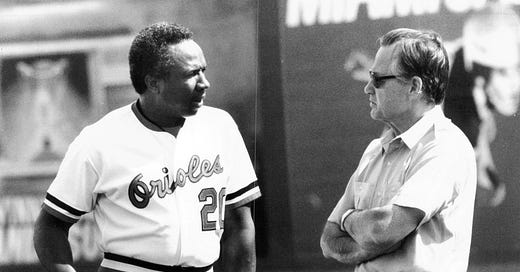The Bird Tapes Interview: Hank Peters
He was the Orioles' GM during baseball's craziest era ever, the years immediately after the players were granted free agency in the 1970s. His vintage interview offers a window into the tumult.
The Orioles didn’t move on from GM Frank Cashen after the 1975 season because owner Jerry Hoffberger was upset about missing the playoffs that year. To the contrary, Hoffberger so trusted Cashen that he wanted the GM out of baseball and by his side full-time as he sold his biggest asset, the National Brewing Company.
As it happened, though, the timing of Cashen’s departure was momentous. Six weeks after Hank Peters was hired as Cashen’s replacement, arbitrator Peter Seitz issued a ruling on December 23, 1975 that effectively nullified baseball’s reserve clause and gave the players the right to free agency after their contracts expired.
To this day, no single change in baseball’s infrastructure has impacted the sport more. Salaries escalated wildly. Roster construction became more dependent on how much money a team spent. Players assumed more of the leverage teams had always wielded in salary negotiations.
“It all hit the fan,” Peters says early in my vintage interview with him, recorded at his home in Baltimore Country a quarter-century ago.
Fortunately for the Orioles, he wasn’t an inexperienced executive when he became their GM. At age 51, he’d been a scout, farm director and major league GM (with Charlie Finley’s Kansas City Athletics). Most recently, he’d presided over the umbrella organization that oversaw the minor leagues.
Even with all that experience, though, he wasn’t prepared for the seismic changes that shook baseball as he became Baltimore’s GM.
“No one foresaw how much things would change,” Peters told me.
The fact that baseball was in the early years of free agency hovered over Peters’ entire tenure as the Orioles’ GM, which lasted a dozen years and included two American League pennants and a World Series victory. As a result, the impact of free agency also hovers over our entire interview, available below to paid Bird Tapes subscribers.
A major figure in Orioles history, Peters, who was 75 when I interviewed him, delves into everything he did, or didn’t do, as he sought to keep the Orioles’ winning tradition going. He traded for Reggie Jackson. Then he failed to re-sign Reggie Jackson. (Earl Weaver ripped him for it in his Bird Tapes interview.) He engineered a trade with the New York Yankees that brought Rick Dempsey, Scott McGregor and Tippy Martinez to Baltimore and “set us up” to keep winning, Peters says.
The Orioles were in an unusual position when he came aboard. They were hugely successful on the field, with numerous titles and playoff appearances to show for it, but they weren’t so great at drawing fans or turning a profit. It shocked me to hear Peters let slip that they may actually have lost money in some years.
in the middle of his first season as GM, Peters says, he wrote Hoffberger a memorandum saying he “wasn’t certain the Orioles are going to be able to compete in the future because we don’t have the revenue to support the kind of contracts you’re going to have to give to better players.” Hoffberger sold the team to Edward Bennett Williams three years later — ironically, just as the Orioles caught fire at the gate and began to draw more fans and produce a better bottom line.
“If that had happened a year earlier (in 1978), Jerry never would have sold,” says Peters, who died at age 90 in 2015.
Hoffberger not selling the Orioles to Williams is a fascinating concept to consider. Williams, a prominent Washington attorney, helped accelerate the attendance boom at Memorial Stadium by tapping into the DC market, and the Orioles kept winning on his watch until they captured a World Series in 1983. But he brought a win-now mentality to the organization and prioritized buying a winner over drafting and developing one — a fateful departure from what had worked so well for so long in Baltimore.
As Peters’ interview churns toward a conclusion, Williams, who fired Peters after the 1987 season and died a year later, looms as the central figure in Peters’ version of what became a long-lasting organizational decline.
To understand what went right and wrong for the Orioles during a stretch of pivotal years, this interview is a must-listen. And it is more than just an account of what happened to one team. It's truly an historical artifact — an account of what it was like to be in baseball when the game changed forever. (Click here to upgrade to a paid subscription and gain access to my entire archive of vintage interviews.)
Keep reading with a 7-day free trial
Subscribe to The Bird Tapes to keep reading this post and get 7 days of free access to the full post archives.





